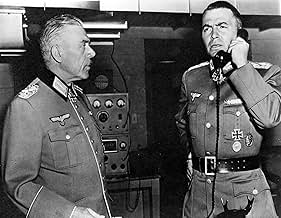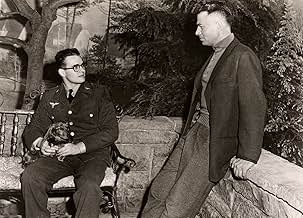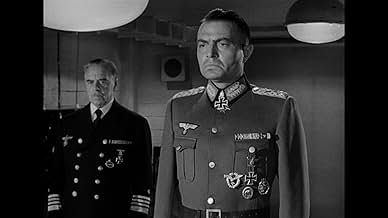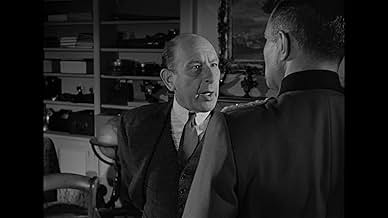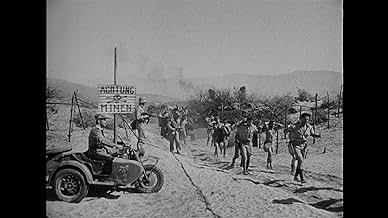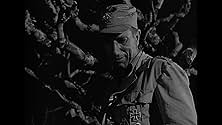NOTE IMDb
6,9/10
7 k
MA NOTE
Ajouter une intrigue dans votre langueThe story of the final years of the respected World War II German general, Erwin Rommel.The story of the final years of the respected World War II German general, Erwin Rommel.The story of the final years of the respected World War II German general, Erwin Rommel.
- Réalisation
- Scénario
- Casting principal
- Récompenses
- 1 victoire au total
Philip Ahlm
- German Soldier & Chauffeur
- (non crédité)
John Alderson
- German Sergeant
- (non crédité)
- …
Jack Baston
- Gen. Alfred Jodl
- (non crédité)
Robert Bohannon
- Minor Role
- (non crédité)
Boyd Cabeen
- Minor Role
- (non crédité)
Roland Carpenter
- German Officer
- (non crédité)
Mary Carroll
- Rommel's Maid
- (non crédité)
Steve Carruthers
- Signal Man
- (non crédité)
Avis à la une
Though The Desert Fox is good as far as it goes and James Mason is perfectly cast as Erwin Rommel, one would hope that a fuller biographical study might be done on the screen.
Erwin Rommel was one of a group of like minded military leaders in various countries who after World War I, rose to the top of their country's military establishment because they saw the value of the tank in any future war. Some of those people would be Charles DeGaulle in France, Dwight Eisenhower and George Patton in America, Marshal Tukachevksy in the Soviet Union and Rommel in Germany.
In 1942 Hitler as he was constantly doing sent Rommel in to bail out the Italians who up to that point had been running the desert campaign in North Africa. With less men and supplies, his tactical ability bedeviled the Allied command until The Second Battle of El Alamein.
The film starts with Rommel as desert warfare genius and then when he does become ill and is invalided out of North Africa, the Allies regain the initiative and beat his famed Afrika Korps. Rommel is then sent to Western Europe to supervise the defenses on the Atlantic.
There comes a point when Rommel does realize that his Fuehrer is destroying his country and becomes involved in the plot to kill him and overthrow the government. That is what most of the film deals with.
James Mason is a stalwart Rommel a perfect conception of the man they called The Desert Fox. In this mostly male film, Jessica Tandy has little to do but be loyal and supportive as Frau Rommel.
Luther Adler who among other parts he played in his long distinguished career was David Ben-Gurion. He goes the whole opposite way in his portrayal of a ranting and malevolent Adolph Hitler. How a man who took his Jewish heritage as seriously as Luther Adler did, prepare for the role of Hitler is beyond my scope. But then again, there were few actors as good as he.
Though Mason does a fine job given what limited material he had to work from, archives have been opened and we know a whole lot more about Erwin Rommel. Time for another biographical study.
Erwin Rommel was one of a group of like minded military leaders in various countries who after World War I, rose to the top of their country's military establishment because they saw the value of the tank in any future war. Some of those people would be Charles DeGaulle in France, Dwight Eisenhower and George Patton in America, Marshal Tukachevksy in the Soviet Union and Rommel in Germany.
In 1942 Hitler as he was constantly doing sent Rommel in to bail out the Italians who up to that point had been running the desert campaign in North Africa. With less men and supplies, his tactical ability bedeviled the Allied command until The Second Battle of El Alamein.
The film starts with Rommel as desert warfare genius and then when he does become ill and is invalided out of North Africa, the Allies regain the initiative and beat his famed Afrika Korps. Rommel is then sent to Western Europe to supervise the defenses on the Atlantic.
There comes a point when Rommel does realize that his Fuehrer is destroying his country and becomes involved in the plot to kill him and overthrow the government. That is what most of the film deals with.
James Mason is a stalwart Rommel a perfect conception of the man they called The Desert Fox. In this mostly male film, Jessica Tandy has little to do but be loyal and supportive as Frau Rommel.
Luther Adler who among other parts he played in his long distinguished career was David Ben-Gurion. He goes the whole opposite way in his portrayal of a ranting and malevolent Adolph Hitler. How a man who took his Jewish heritage as seriously as Luther Adler did, prepare for the role of Hitler is beyond my scope. But then again, there were few actors as good as he.
Though Mason does a fine job given what limited material he had to work from, archives have been opened and we know a whole lot more about Erwin Rommel. Time for another biographical study.
Although a very well crafted and watchable film that stays close to the historical characters and events, without the usual Hollywood treatment of such period war movies - action heroes, love interest, bangs and explosions etc., however there is some strange castings. Notably Manfred, Rommel's son, who looks like a 1950's geeky American college kid. Jessica Tandy, a much underrated actress is superb. Mason could act the pants of any other actor and shines in this film, as indeed he did playing the same role in The Desert Rats. Richard Boone in a rare non-cowboy role makes me wonder why he never prospered in mainstream cinema. For once Hollywood manages to make a factual film without distorting history in order to get bums on seats and sell popcorn.
Wonderful performances, first-rate script and direction (moving musical score in key places, as well), plus a well-structured theme about moral dilemmas of patriotic soldiers who realize they're obeying evil orders, make this a little-known gem.
Did Rommel really participate in the plot to kill Hitler? Hitler sure thought so. He had his favorite general poisoned; about that there is no question.
Did Rommel know Hitler before the war? Not sure when they became acquainted but Rommel ran AH's bodyguard unit for a while, then became one of Hitler's favorite generals when he helped sweep the British to Dunkirk in 1940.
Was Rommel aware of and morally responsible for the Holocaust? A recent award winning Rommel biography cites one scene I wish they could have included in this film: Rommel around 1941 advised Hitler that he was concerned by Allied carping on German anti-semitism. "Why don't we put some Jews into prominent leadership positions and shut them up?" Rommel suggested. Hitler told Rommel to stick to military matters and, after the general exited the room, told associates: "That fellow has absolutely no understanding of what we are trying to accomplish."
The movie does generally succeed in portraying the theme of a soldier so single-mindedly focused on the professional technique of his job that he only slowly awakens to the moral horror and self-destructiveness of the leader he serves.
The Churchill quote used at the film's ending is meant to address (and answer) the questions about whether it is morally proper to make a film that glorifies a Nazi general. If Churchill could say such magnanimous things about him...and it's an accurate quote...then so could Hollywood.
(Interesting historical note: British film audiences in the early 1950s were not in such a generous mood. The studio quickly churned out the much-inferior "Desert Rats" film, featuring Mason as a more-villainous Rommel, to mollify outraged critics.)
Where did the quote come from that is spoken in this film by von Reunstadt: "Victory has a thousand fathers, but defeat is an orphan"? Yes, JFK used it, famously, after the Bay of Pigs fiasco. Many newsmen of the time mistakenly credited the president with originating it, but JFK didn't claim credit for it. The line has since been traced back to some Italian count in the 1500s. His name was Ciano or something like that. But JFK was a big movie fan and, my guess is, probably learned this aphorism from "The Desert Fox" a decade before using it in his famous post-Bay of Pigs press conference!
Did Rommel really participate in the plot to kill Hitler? Hitler sure thought so. He had his favorite general poisoned; about that there is no question.
Did Rommel know Hitler before the war? Not sure when they became acquainted but Rommel ran AH's bodyguard unit for a while, then became one of Hitler's favorite generals when he helped sweep the British to Dunkirk in 1940.
Was Rommel aware of and morally responsible for the Holocaust? A recent award winning Rommel biography cites one scene I wish they could have included in this film: Rommel around 1941 advised Hitler that he was concerned by Allied carping on German anti-semitism. "Why don't we put some Jews into prominent leadership positions and shut them up?" Rommel suggested. Hitler told Rommel to stick to military matters and, after the general exited the room, told associates: "That fellow has absolutely no understanding of what we are trying to accomplish."
The movie does generally succeed in portraying the theme of a soldier so single-mindedly focused on the professional technique of his job that he only slowly awakens to the moral horror and self-destructiveness of the leader he serves.
The Churchill quote used at the film's ending is meant to address (and answer) the questions about whether it is morally proper to make a film that glorifies a Nazi general. If Churchill could say such magnanimous things about him...and it's an accurate quote...then so could Hollywood.
(Interesting historical note: British film audiences in the early 1950s were not in such a generous mood. The studio quickly churned out the much-inferior "Desert Rats" film, featuring Mason as a more-villainous Rommel, to mollify outraged critics.)
Where did the quote come from that is spoken in this film by von Reunstadt: "Victory has a thousand fathers, but defeat is an orphan"? Yes, JFK used it, famously, after the Bay of Pigs fiasco. Many newsmen of the time mistakenly credited the president with originating it, but JFK didn't claim credit for it. The line has since been traced back to some Italian count in the 1500s. His name was Ciano or something like that. But JFK was a big movie fan and, my guess is, probably learned this aphorism from "The Desert Fox" a decade before using it in his famous post-Bay of Pigs press conference!
The film is a Rommel biography written by Lt.Colonel Desmond Young and screenwriter Nunnally Johnson . It's based on true events and real characters . In WWII Field Marshal Erwin Rommel won reputation as Germany's most popular General but he played an important part in the invasions of central Europe and France . At the same time he was regarded by many Allied officers as a master of desert warfare and as a fair-minded professional . Erwin Rommel (James Mason) really achieved fame as the commander of the German Afrika Korps , operating against the British in North Africa and he captured Tobruk ,the key to the British defenses . Quick to see advantage and profit from it , he ran rings round the British for almost two years before being stopped at Alamein and then driven out of Africa by General Marshal Montgomery . Later on , Rommel was given command of Army in northern Italy to prevent an Italian defection and to counter an Allied invasion of Southern Europe . In 1944 he was transferred to command of an army group in northern France.On two occasions,Rommel and Von Rundstedt (Leo G.Carroll) saw Hitler and attempted to convince him that he should end the war while considerable German forces still existed.The pale and shaken Fuehrer met their frankness with angry diatribes.After the Allied invasion of Normandy (June 6,1944) , Rommel was severely injured when his automobile was strafed by a British plane,and he was sent home to Ulm to recover along with his wife Frau Lucie Marie (Jessica Tandy) , his personal assistant Capt.Hermamn (Richard Boone) and military son. By this time , he had become increasingly disillusioned not only by Hitler's unrealistic military leadership but also by the worldwide reaction to Nazi atrocities . He opposed the project assassination attempt on Hitler's life on the ground that this action would only create martyr . Rommel never took an active role in the July Plot executed by Colonel Klaus Von Stauffenberg (Edward Franz) , although the conspirators wanted him as Chief of state after the elimination of Hitler.However the plot failure ,one of the conspirators , before he died in agony on a meat hook , blurted out Rommel's name to his tormentors and his doom was sealed , offered the choice of a court-martial or reprisals against his his family or suicide.
In the film appears famous Nazi characters who are well interpreted by awesome actors , as Hitler featured by Luther Adler gives an excellent performance (but doesn't reach to Bruno Ganz in ¨The downfall¨) , Edward Franz as a magnificent Von Stauffenberg , Leo G. Carroll as Von Rundstedt , Everett Sloane (Gen. Wilhelm Burgdorf) , George Mc Ready (Gen.Fritz Bayerlein) , John Hoyt (Gen.Keitel) and of course Rommel's James Mason who displays a first-rate interpretation and he'll repeat role in ¨The Desert Rats¨ (1953) by Robert Wise . The motion picture was professionally directed by Henry Hathaway . Rating : Good , above average and well worth watching .
In the film appears famous Nazi characters who are well interpreted by awesome actors , as Hitler featured by Luther Adler gives an excellent performance (but doesn't reach to Bruno Ganz in ¨The downfall¨) , Edward Franz as a magnificent Von Stauffenberg , Leo G. Carroll as Von Rundstedt , Everett Sloane (Gen. Wilhelm Burgdorf) , George Mc Ready (Gen.Fritz Bayerlein) , John Hoyt (Gen.Keitel) and of course Rommel's James Mason who displays a first-rate interpretation and he'll repeat role in ¨The Desert Rats¨ (1953) by Robert Wise . The motion picture was professionally directed by Henry Hathaway . Rating : Good , above average and well worth watching .
This is a pretty solid attempt to portray a soldier's great dilemma - balancing loyalty to the state and obedience to orders with the higher calling of loyalty to what's right and just. Erwin Rommel was one of the great German generals of World War II (a hero in Germany and respected by the Allies.) In the end, he also became involved with the conspiracy against Hitler. The movie shows us some of that development, beginning with his incredulousness at Hitler's orders that the Afrika Korps stand and fight to the last man in Africa rather than withdrawing to fight another day. According to the movie, it was this "stand and fight to the last man" attitude of Der Fuhrer that finally pushed Rommel over the edge. That makes Rommel consistent with what I know of most of the leaders of the "resistance" (such as it was) to Hitler. The opposition wasn't political; it wasn't based on a rejection of Nazi ideology or distaste for Hitler's racial policies - it tended to be based simply on the belief that Hitler was leading Germany to defeat in the war. That's the overarching sentiment portrayed here. That being the case, Rommel may not have been the sympathetic character this movie makes him out to be - maybe he just had the smarts to realize that Germany was fighting a losing war. There's also no mention of his performance during the German invasion of France in 1940, in which Rommel - as a panzer commander - received some German criticism for both his tactics and his tendency to exaggerate his achievements.
James Mason was very good as Rommel. His portrayal was believable, although I wish there had been more exploration in the story of where Rommel came from rather than simply starting us abruptly in Africa. Made only 6 years after the end of the war, the movie is also somewhat courageous in presenting a German general (even one who was unsympathetic to Hitler) in such a sympathetic light. I didn't find this to be structured particularly well. There was too much narration involved, which seemed put an end to any flow the movie might have been trying to develop. Some scenes (particularly of the Allied landings on D-Day) featured a little too much patriotic American and British and French music as the troops went ashore (frankly, listening to the Marine Fight Song or The Marseillaise in a movie about Rommel seemed a bit silly.)
It's an interesting movie, but doesn't seem to completely capture the man it portrays.
James Mason was very good as Rommel. His portrayal was believable, although I wish there had been more exploration in the story of where Rommel came from rather than simply starting us abruptly in Africa. Made only 6 years after the end of the war, the movie is also somewhat courageous in presenting a German general (even one who was unsympathetic to Hitler) in such a sympathetic light. I didn't find this to be structured particularly well. There was too much narration involved, which seemed put an end to any flow the movie might have been trying to develop. Some scenes (particularly of the Allied landings on D-Day) featured a little too much patriotic American and British and French music as the troops went ashore (frankly, listening to the Marine Fight Song or The Marseillaise in a movie about Rommel seemed a bit silly.)
It's an interesting movie, but doesn't seem to completely capture the man it portrays.
Le saviez-vous
- AnecdotesErwin Rommel's widow, Lucie Marie Rommel acted as a technical consultant and adviser to this movie. She was played by Jessica Tandy in the film itself. Mrs. Rommel lent the production some of her husband's personal artifacts and liaised with Nunnally Johnson, the film's producer and screenwriter. As Frau Lucie Maria Rommel, Mrs Rommel later also acted as a military consultant to the film Le Jour le plus long (1962) made by 20th Century-Fox, the same studio that produced this movie.
- GaffesThe opening commando raid shows at least a dozen German soldiers killed. In reality, only four were killed.
- Citations
Field Marshal Gerd von Runstedt: [It's] too late for me. I'm seventy now - too old to fight, too old to challenge authority, however evil... but not too old, however, to wish you and your friends the best of luck in their extremely interesting enterprise.
- Crédits fousThe 20th Century Fox logo appears without the usual fanfare.
- ConnexionsEdited from Victoire du désert (1943)
- Bandes originalesThe Army Air Corps Song
(uncredited)
Music by Robert Crawford
Heard during the scenes of D-Day and the ensuing battles
Meilleurs choix
Connectez-vous pour évaluer et suivre la liste de favoris afin de recevoir des recommandations personnalisées
Détails
- Durée
- 1h 28min(88 min)
- Couleur
- Rapport de forme
- 1.37 : 1
Contribuer à cette page
Suggérer une modification ou ajouter du contenu manquant


